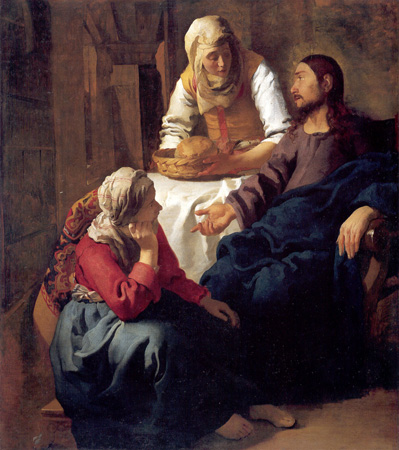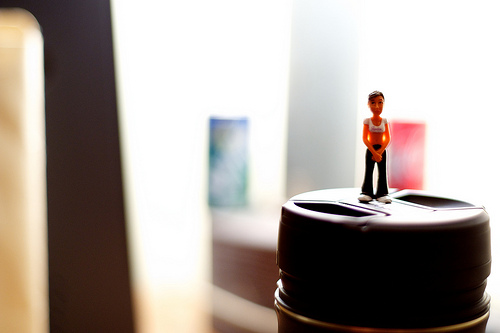
Anxiety is technically defined as:
Noun: 1. distress or uneasiness of mind caused by fear of danger or misfortune…2. earnest but tense desire; eagerness…
The psychiatric definition is this: “a state of apprehension and psychic tension occurring in some forms of mental disorder.” I would like to suggest that this mental disorder is simply “being human.” Humans are anxious. Humans can be anxious. We have been, currently are, or will be anxious at some point. Animals typically do not have anxiety. I have a cat, Joe, and he is not anxious. Anything that sleeps that much, waking only to stretch and reposition himself to go back to sleep is not anxious.
One of the fundamental reasons why my cat Joe is not anxious is because his “work” involves sleeping, eating, occasionally batting something around and escaping from the house when any door opens. Joe’s work never oppresses him. To be oppressed by work is a unique characteristic of being human, and anxiety is the manifestation of the realization of the oppression of work (did that make sense?). In other words, if you have anxiety, you are human. Anxiety represents the awareness of not being in control. The chief times I personally have anxiety is when it seems like everything is colliding and I have no plan of attack. When I can’t even begin to comprehend what I have to get done, I begin to fear: fear of failure, fear of everything collapsing, fear of disappointing advisers, family, friends, myself… The definition for anxiety is right: anxiety incorporates fear of something occurring that is beyond our control. To go further than that, anxiety is also the association between works and person that is so closely bound that the work defines the person (I have anxiety when I do not do well on a paper because I see myself as a good student… I have anxiety with the work involved to be a ‘good mother’ because my work defines whether or not I am good). It is an indication, perhaps, of how hard-wired we are for what theologians call “works righteousness,” in other words.
Let’s switch gears a bit. In my opinion anxiety gets a bad rap. We are taught numerous tricks and tips to not only rid ourselves of anxiety (don’t get me wrong, it is very good not to live in a constant state of anxiety) and how to avoid it. But, if anxiety is a uniquely human event, then doesn’t anxiety convey to us that we are very human? That we are realizing how out of control we are…and that we may need something more than good relaxation techniques and yoga positions? In this sense, anxiety is a gift because it reduces us to what we are: human.
Luke 10:38-42
Now as they went on their way, Jesus entered a village. And a woman named Martha welcomed him into her house. And she had a sister called Mary, who sat at the Lord’s feet and listened to his teaching. But Martha was distracted with much serving. And she went up to him and said, “Lord, do you not care that my sister has left me to serve alone? Tell her then to help me.” But the Lord answered her, “Martha, Martha, you are anxious and troubled about many things, but one thing is necessary. Mary has chosen the good portion, which will not be taken away from her.”
From reading verse 38 we know that Jesus has traveled to a small village, the home of Martha and Mary (v.38-39)—two sisters of whom, Martha, welcomes Jesus into their home. After Martha has welcomed Jesus into their home, Luke tells us that Mary has placed herself at the feet of Jesus, “And she had a sister called Mary, who sat at the Lord’s feet and listened to his teaching” (v.39). Mary actively stopped what she was doing and placed herself at Jesus’ feet. In verse 40 we read,
But Martha was distracted with much serving. And she went up to him and said, “Lord, do you not care that my sister has left me to serve alone? Tell her then to help me.”
 In this verse, Martha, distracted or busied with many things, vents her frustration to Jesus over the fact that Mary is not assisting her with the work. Martha is compelled and put under pressure to such an extent that she can’t take it any more that her sister is not helping her, so she solicits Jesus to remedy the situation. Let’s not vilify Martha: she is doing a very good thing. She is doing exactly what is expected of her…but not just of her but also of Mary. Mary has left her sister to do the work and Martha is feeling the weight of getting it all done. And she’s realized that, by herself, she cannot get it done. She is exasperated (indicated by her question: ““Lord, do you not care that my sister has left me to serve alone?”). Some scholars seem to criticize her for having a ‘skewed’ perspective: that she values the work over the guest (Jesus). While it is skewed and it is wrong, it’s completely human. Distracted by many things (worried and anxious about how it will all get done if her sister does not help her) she questions Jesus…she calls out: don’t you care? Don’t you care that my sister has left me to do all the work? She desires for Jesus to intervene. Do something, Martha requests (demands)…
In this verse, Martha, distracted or busied with many things, vents her frustration to Jesus over the fact that Mary is not assisting her with the work. Martha is compelled and put under pressure to such an extent that she can’t take it any more that her sister is not helping her, so she solicits Jesus to remedy the situation. Let’s not vilify Martha: she is doing a very good thing. She is doing exactly what is expected of her…but not just of her but also of Mary. Mary has left her sister to do the work and Martha is feeling the weight of getting it all done. And she’s realized that, by herself, she cannot get it done. She is exasperated (indicated by her question: ““Lord, do you not care that my sister has left me to serve alone?”). Some scholars seem to criticize her for having a ‘skewed’ perspective: that she values the work over the guest (Jesus). While it is skewed and it is wrong, it’s completely human. Distracted by many things (worried and anxious about how it will all get done if her sister does not help her) she questions Jesus…she calls out: don’t you care? Don’t you care that my sister has left me to do all the work? She desires for Jesus to intervene. Do something, Martha requests (demands)…
And this is why I love Martha, specifically here in this moment…she is full of humanity. This isn’t to say that Mary is not full of humanity, she is…in fact, she represents humanity in its fullest in the sense that she is loving God with all her mind, heart, strength and soul…she is exhibiting what it means to love God as the first commandment dictates: totally and exclusively. Mary has chosen the better part (v.42). But, what I love about Martha is that she needs to be brought out of herself, out of any delusions that she is in control. Her anxiety forces her to call out, to call for help. Without first going through what Martha is experiencing, we do not get to position Mary is in. We cannot recognize the good unless we have been forced to reckon with the good, forced to recognize it. We need to be called out and brought to the good; and there is no better place from which to start than at the end of your rope, ready to give up…Martha, for all intents and purposes, when she questions Jesus asking him for help, says: I can’t…and she knows that He can.
But the Lord answered her, “Martha, Martha, you are anxious and troubled about many things, but one thing is necessary. Mary has chosen the good portion, which will not be taken away from her.”
And he does. Jesus does do something. But not in the way Martha expected. Rather than command Mary to help her sister, Jesus calls Martha to himself. Completely frustrated and full of anxiety over what she has to get done, He, the living Word the Gospel, calls her to Him. He lovingly addresses Martha – using her name, twice: Martha…Martha… – he emotes his concern for her preoccupation with many things. He paints a picture of a woman who is overwhelmed… who is “anxious and troubled” (10:41). Jesus proclaims: “…but one thing is necessary.” (v.42a). This is Jesus preaching himself; he is the good portion. And this good portion calls to Martha; beckons to her. Martha Martha you are worried and anxious about many things…he illuminates her anxiety (even heightens it…rather than just being distracted she is, according to Jesus: anxious and troubled) and her failure in not seeing the good portion. Notice he does not chastise her for it. And he does not simply say: stop it! Stop being anxious, Martha, it’s wrong!
This is one of the fundamental differences between the law and the gospel. The law is static; the Gospel is dynamic. The law cannot get you to do what it commands, it can only command (do this; don’t do this); but it cannot beckon nor plea nor cause you to hear; it can only leave you in its judgment. The Gospel goes farther. The gospel takes the hearer and moves her, walks her to its decision, its conclusion. The gospel seizes the one who hears and brings her to the foot of the cross, to the feet of Jesus. To get to the position of Mary, we must be called out my anxiety in the midst of our anxiety in the same way Martha has been called out…we must first hear the beckoning of the Gospel, we must hear the tender and loving call of Jesus through the proclamation of the Gospel, “Lauren, Lauren, I am the good portion…the only thing that is necessary.” And in that hearing, the type of hearing that defines shema (Deut. 6:1-9), I am brought to Jesus’ feet, to the point that I can recognize the good portion when it enters the room. Jesus, the gospel message, enters (by the event of the Cross) into our mess, our disordered priorities, our anxiety , and draws us out and into relation with him and in that relation with him we are given the good portion, the only necessary thing and we are given peace (John 14:27).
What’s more is that you and I have more of the story than Martha does. We know about the event of the cross and that Jesus died for our transgressions and was raised for our justification (Romans 4:25). We are justified by faith apart from works, or work period. This is the gospel message…and it exposes our situation for what it is: out of our control; and not only that but also this: Jesus is in control. The gospel message tells us that we are neither defined by our failures nor successes. This is why we need to continually hear this message, continually be reminded of it. In hearing, we are given freedom from our anxieties. We are not told ‘don’t be anxious’; we are told about the justification of sinners, that God is in control, that it’s not up to us to quell our anxieties. We can’t. Instead, we are first hearers and then responders—we must be called like Martha and hear, in the midst of our anxiety, if we are to respond like Mary.
See also When Life and Beliefs Collide by Carolyn Custis James. First and Last photos by Josiah Miller.

COMMENTS
2 responses to “Mary, Martha, and the Humanity of Anxiety”
Leave a Reply














It’s funny, this is one of my issues with Matthew 6:24-34. This is often preached as a comfort, and I can sometimes take it this way. However, only when I have the cross as my lense. Taken by itself the “Do not worry” passage leads me to despair, because I ALWAYS worry. Also, please note that I inlcuded verse 24, which says “No one can serve two masters. Either you will hate the one and love the other, or you will be devoted to the one and despise the other. You cannot serve both God and money.” So Jesus says don’t serve money, and then his EXAMPLE is worrying about food and clothing…… this is not what I usually have in mind when I consider worshiping money, but there it is. As has been mentioned before, the sermon on the mount is not meant to teach us how to live, but showing us why Jesus has to die.
It is definitely true that the teachings of Jesus must be seen retroactively through the lens of the death and resurrection of Jesus. But his commands are not just for the purpose of revealing our moral impotence . Beyond showing us our desperate need for salvation, we are being called to a life of uncompromising surrender and renewed commitment to follow him.